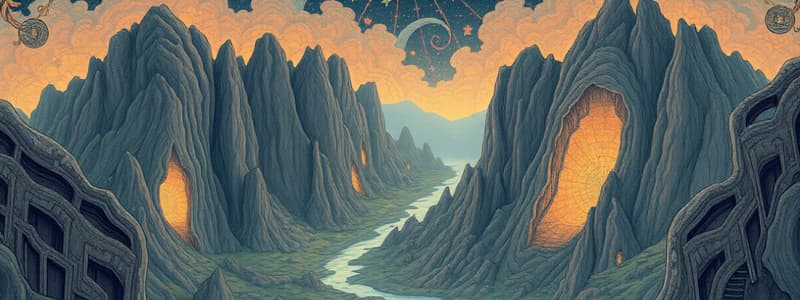Podcast
Questions and Answers
What factor primarily shapes the character of a landscape?
What factor primarily shapes the character of a landscape?
- Climate and weather patterns
- Proximity to urban areas
- The availability of resources
- The action and interaction of natural and human elements (correct)
Which type of rock is formed from the cooling and hardening of magma?
Which type of rock is formed from the cooling and hardening of magma?
- Metamorphic rock
- Sedimentary rock
- Fossilized rock
- Igneous rock (correct)
What geological feature is associated with the collision of tectonic plates in the UK?
What geological feature is associated with the collision of tectonic plates in the UK?
- River valleys
- Desert regions
- Mountain ranges (correct)
- Flat plains
Which rock type is the youngest in the UK, formed during the time of swamps and shallow seas?
Which rock type is the youngest in the UK, formed during the time of swamps and shallow seas?
What main effect did glaciation have on the UK landscape?
What main effect did glaciation have on the UK landscape?
Which of the following locations is known for its igneous rock formations from past volcanic activity?
Which of the following locations is known for its igneous rock formations from past volcanic activity?
The Tees-Exe line is significant because it marks what?
The Tees-Exe line is significant because it marks what?
Which of the following statements is false regarding the impact of tectonic activity on the UK’s landscape?
Which of the following statements is false regarding the impact of tectonic activity on the UK’s landscape?
Which type of rock is primarily found in the northern upland areas of the UK?
Which type of rock is primarily found in the northern upland areas of the UK?
What is the primary material from which limestone and chalk are formed?
What is the primary material from which limestone and chalk are formed?
Which of the following statements about clay and shales is true?
Which of the following statements about clay and shales is true?
Which metamorphic rock originates from shale under pressure and heat?
Which metamorphic rock originates from shale under pressure and heat?
What is true regarding the permeability of limestone?
What is true regarding the permeability of limestone?
Which statement best describes the hardness and resistance to erosion of metamorphic rocks?
Which statement best describes the hardness and resistance to erosion of metamorphic rocks?
In which landscape would you typically find clay?
In which landscape would you typically find clay?
What happens to clay when it becomes saturated with water?
What happens to clay when it becomes saturated with water?
What type of rock is characterized by being very hard and impermeable, typically forming upland environments?
What type of rock is characterized by being very hard and impermeable, typically forming upland environments?
Which type of landscape is associated with granite due to its impermeability?
Which type of landscape is associated with granite due to its impermeability?
Flashcards are hidden until you start studying
Study Notes
Landscapes & Geology
- Landscapes are characterized by the interaction of natural and human elements
- Geology is the foundation of a landscape, influencing its relief and attracting human activity
- The movement of tectonic plates has played a key role in shaping the UK's landscape
- The UK's geological structure is a result of plate movement, volcanic activity, and glaciation
- Resistant rocks like granite and slate are typically found in upland areas, while softer rocks like limestone and clay are more common in lowlands
Tectonic Activity and Rock Formation
- The UK was once located in the tropics, resulting in the formation of limestones in areas like the Peak District
- Later, the UK moved to its present position, leading to the formation of chalks and clays in shallow seas and swamps
- Plate collisions caused folding and uplift, creating upland areas like the Scottish Highlands, Snowdonia, and the Lake District
- Pressure and heat from plate collisions transformed rocks into metamorphic rocks like slate and schist
- The Giant's Causeway in Northern Ireland was formed by volcanic activity, with its hexagonal basalt columns
Glaciation's Impact
- The most recent Ice Age significantly affected both upland and lowland landscapes in the UK
- Glaciers covered upland regions, shaping areas like Snowdonia and the Lake District
- Glacial debris, such as clay, was deposited in lowland areas by glacial meltwater
Rock Types and Their Characteristics
- The geological characteristics of rocks determine landscape features
- Igneous rocks like granite are hard and resistant to weathering, forming rugged upland landscapes
- Metamorphic rocks like slate are also highly resistant to erosion
- Sedimentary rocks like limestone and chalk are relatively softer, forming gentler landscapes
- Limestone is permeable, allowing water to flow through it, leading to features like caves and karst landscapes
- Clay is impermeable, making it difficult for water to drain, resulting in flat, waterlogged landscapes
- Clay's properties also contribute to slumping and landslides, which are common in clay landscapes
- The permeability of rocks also affects the drainage patterns of landscapes
Rock Type, Hardness, Resistance, Permeability, and Landscape Features
- Igneous Rocks: Hard, resistant, impermeable, found in uplands, associated with boggy and poorly drained landscapes
- Metamorphic Rocks: Very hard, very resistant, impermeable, found in uplands, associated with poorly drained and boggy landscapes
- Sedimentary Rocks: Hardness varies (hard to very soft), less resistant, permeability varies, found in lowlands:
- Limestone: Hard, moderately resistant, permeable, forms caves and karst landscapes
- Chalk: Soft, less resistant, permeable, forms dry valleys, gentle hills inland, and steep cliffs on the coast
- Clay: Soft, easily collapses when wet (slumping), impermeable, forms gentle, wide, waterlogged landscapes
Studying That Suits You
Use AI to generate personalized quizzes and flashcards to suit your learning preferences.




